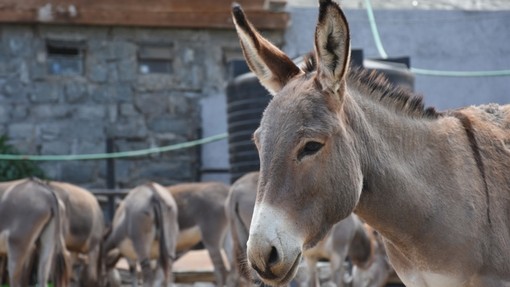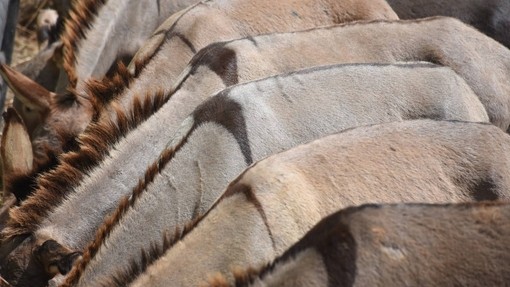
Co-creating guidelines
Working together with Emirates, we have co-created the Aviation Risk and Threat Assessment operational guidelines to highlight the risks posed by the donkey skin trade and its association with serious and organised criminal activity.
Our latest figures reveal that an estimated six million donkeys are killed for their skins each year, the majority in Africa. These skins are then exported across the world, by ship and by air, before being used to make traditional medicine and remedies.
Our research with the University of Oxford’s Saïd Business School and Wildlife Conservation Research Unit (WildCRU), produced significant evidence that exposed the link between the movement of donkey skins with other illegal wildlife trafficking and organised crime. The unregulated and unhygienic skin trade also poses a serious threat to global biosecurity.
Emirates has already implemented a ban on the carriage of donkey hides. In February this year, African Heads of State endorsed a continent-wide moratorium on the slaughter of donkeys for their skins at the 37th African Union (AU) Summit. Within days of the AU decision, Emirates extended its zero-tolerance policy on the carriage of banned species, hunting trophies and other associated products, to include donkey hides and parts.
Already a leader in efforts to combat the illegal wildlife trade, the airline has established stringent protocols including screening, spot checks during transit, in depth document verification, and confirming the authenticity of permits; in addition to providing education and training for its employees across cargo and passenger operations to identify and report smuggled wildlife.
The co-created factsheet will provide the wider aviation industry with critical knowledge in the fight against the donkey skin trade. The operational guidelines explain the biosecurity risk of smuggling inadequately processed donkey skins alongside legitimate cargo such as leather or textiles, for example. It also highlights concealment methods and crime convergence, where networks involved in the donkey skin trade may also be linked to organised crime such as wildlife and drug trafficking.

By highlighting the risks associated with the donkey skin trade and offering practical advice, both ourselves and Emirates hope other airlines will be encouraged to bolster their own detection and enforcement efforts to stop traffickers and criminals in their tracks.
Our CEO, Marianne Steele, said: “This is another welcome step in the battle against the illegal trade in donkey skins within the transportation sector. We are proud to work alongside Emirates, which is setting new standards with its support for our work and the tightening of its own trafficking polices. We hope that others in the aviation industry will follow suit and join us in cracking down on this cruel and unstainable trade.
“All measures that shine a light on the inhumane trade in donkey skins are to be applauded, especially given its links to illegal wildlife trafficking and organised crime as well as the threat to human health for everyone involved at every stage in the process.”
Robert Fordree, Senior Vice President of Cargo Operations Worldwide, Emirates SkyCargo said: “We are proud to bring our expertise in both air logistics and the fight against illegal wildlife trafficking to the preparation of these guidelines. In close collaboration with The Donkey Sanctuary, we have highlighted some of the ways bad actors can exploit the logistics network to transport illicit goods, while also suggesting operational initiatives that can be implemented across the aviation ecosystem to stop trafficking in its tracks. Our hope is that by working with likeminded partners, we can protect the world’s biodiversity for generations to come.”
Find out more about the guidelines we co-created with Emirates
Share this page
Tags
- News





